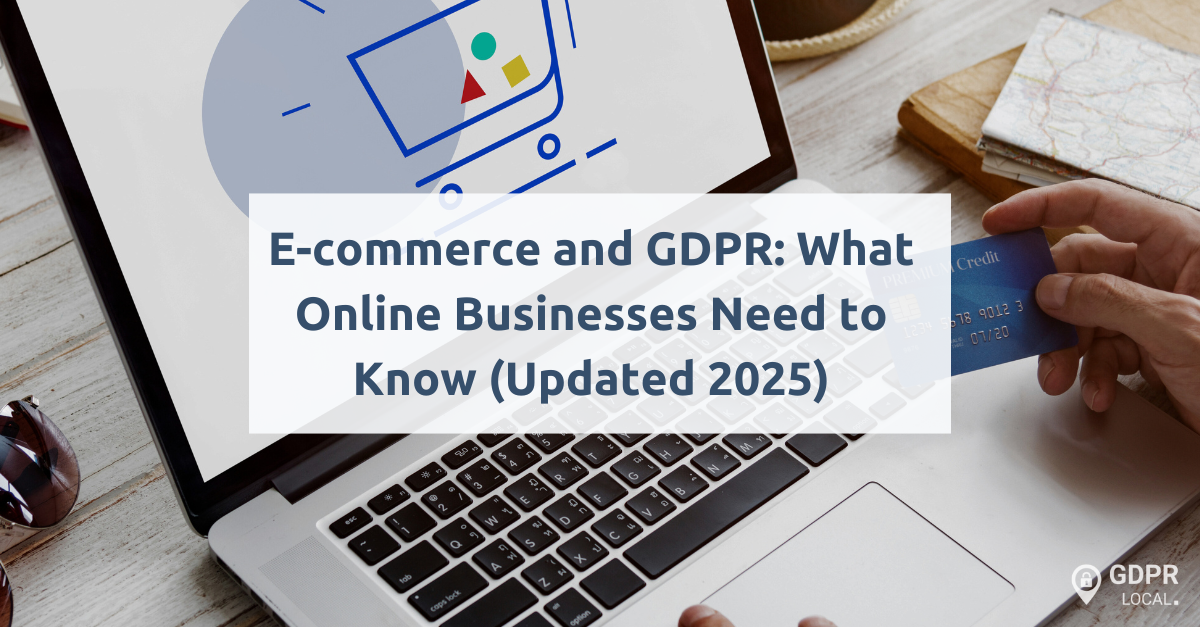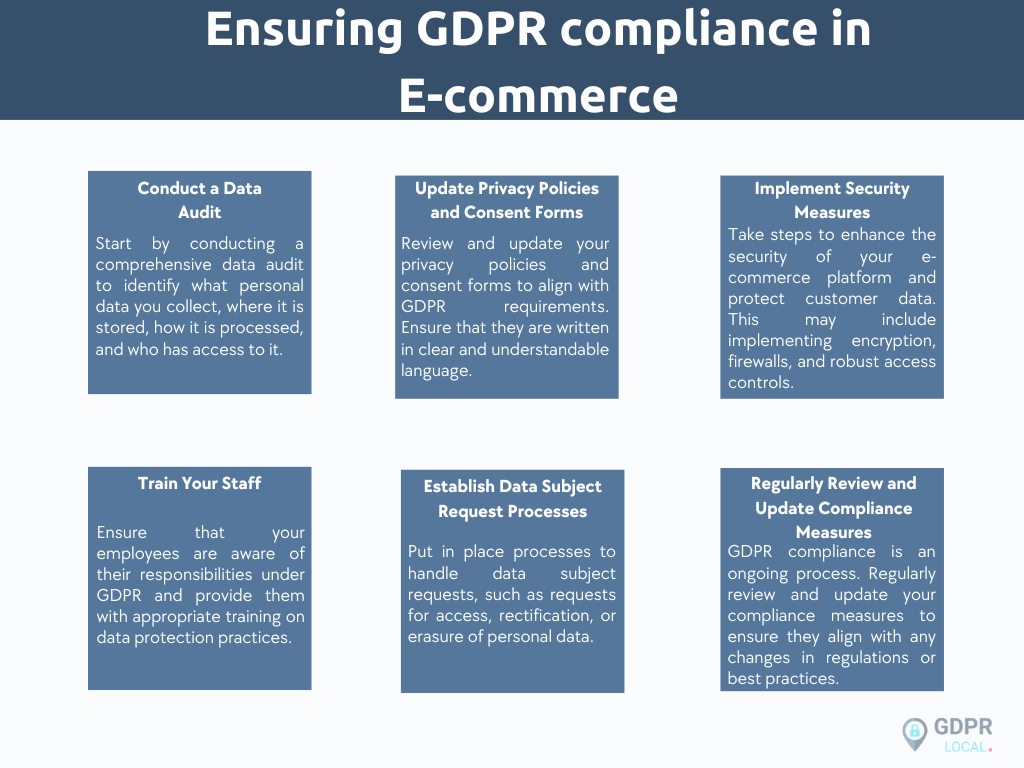
E-commerce and GDPR: What Online Businesses Need to Know (Updated 2025)
For many online businesses, data protection has become a critical concern. With the introduction of the General Data Protection Regulation (GDPR) in 2018, organizations must comply with strict guidelines to ensure the privacy and security of personal data. This article will explore the relationship between e-commerce and GDPR and discuss what online businesses need to know to navigate this complex landscape.
GDPR – A Short Summary
The General Data Protection Regulation (GDPR) was introduced in 2018 by the European Union (EU) as a comprehensive data protection framework. Its primary objective is to protect the privacy and security of personal data belonging to individuals within the EU and the European Economic Area (EEA). GDPR applies to any organization that collects and processes personal data of EU citizens, regardless of its location.
The regulation defines personal data as any information that relates to an identified or identifiable natural person. This includes names, addresses, email addresses, financial information, and even IP addresses. GDPR grants individuals greater control over their personal data and imposes strict obligations on organizations to handle this data responsibly.
Why should E-commerce brands be GDPR Compliant?
GDPR has significant implications for e-commerce businesses. Online retailers collect a lot of personal data, including customer names, addresses, payment details, and purchase history. It is crucial for these businesses to understand how GDPR affects their operations and take the necessary steps to ensure compliance.
Consent and Transparency
Under GDPR, organizations must obtain explicit and freely given consent from individuals before collecting and processing their personal data. This means that e-commerce businesses need to be transparent about how customer data will be used and give individuals the option to opt-in or opt-out of data collection. Consent forms and privacy policies should be clear, concise, and written in plain language.
Data Minimization and Purpose Limitation
Another fundamental principle of GDPR is data minimization. E-commerce businesses should only collect and retain the minimum amount of personal data necessary to fulfill the intended purpose. Moreover, organizations must specify the purpose for which the data is being collected and ensure that it is not used for any other purposes without obtaining additional consent.
Data Security and Breach Notification
Data security is of utmost importance in e-commerce. GDPR requires organizations to implement appropriate technical and organizational measures to protect personal data from unauthorized access, loss, or disclosure. In the event of a data breach, businesses must notify the relevant supervisory authorities and affected individuals within 72 hours of becoming aware of the breach.
Individual Rights
GDPR grants individuals several rights regarding their personal data. E-commerce businesses must be prepared to address these rights, which include the right to access, rectify, and erase personal data and the right to data portability. Organizations should have processes in place to handle data subject requests and provide individuals with the necessary information and tools to exercise their rights.
Best GDPR practices for e-commerce businesses
Complying with GDPR can be a complex undertaking for e-commerce businesses. However, by following a few key steps, online retailers can ensure they meet their obligations and protect customer data.

You can audit your data processing activities to identify compliance gaps or potential risks. By updating the policies and consent forms, people will know how their data is processed and their rights under GDPR.
By monitoring your systems for any vulnerabilities or suspicious activities, you can promptly address any issues that arise.
Training your staff will help your employees understand the importance of safeguarding personal data and ensure compliance throughout your organization.
Be sure to designate a point of contact within your organization to handle these requests and establish clear procedures for verifying the identity of data subjects.
Additionally, stay informed about new developments in data protection and adjust your practices accordingly.
What are the penalties if your e-commerce brand is not GDPR compliant?
Non-compliance with GDPR can lead to serious financial and reputational consequences for e-commerce businesses. Supervisory authorities can impose fines of up to €20 million or 4% of your company’s global annual turnover, whichever is greater, depending on the severity of the violation. These penalties apply to various infringements, including improper data handling, lack of user consent, and failure to respond to data subject requests. Beyond fines, your business may face investigations, legal challenges, and a significant loss of customer trust, which can severely impact your brand’s credibility and bottom line.
Common Mistakes E-commerce Businesses Make Regarding GDPR
Many e-commerce businesses struggle with GDPR compliance due to common oversights. One frequent mistake is using pre-ticked consent boxes or vague privacy policies that fail to explain clearly how customer data is used. Others collect more data than necessary or retain it longer than required, violating the principles of data minimization and purpose limitation. Inadequate security measures or delayed responses to data breaches can lead to non-compliance. Additionally, some businesses neglect to provide clear procedures for handling data subject rights, such as access or deletion requests. Avoiding these mistakes starts with adequately understanding GDPR and building privacy in every level of your data processing operations.
How can GDPRLocal help?
Navigating the complexities of GDPR compliance can be challenging for e-commerce businesses. We offer comprehensive solutions to help online retailers achieve and maintain GDPR compliance.
GDPR Audit and Compliance Assessment
We can provide a thorough audit and compliance assessment to identify non-compliance areas and recommend remedial actions. Our team of experts examines your data processing activities, privacy policies, consent forms, and security measures to ensure they align with GDPR requirements.
Data Protection Officer (DPO) Services
Having a dedicated Data Protection Officer (DPO) service to assist e-commerce businesses in fulfilling the obligations under GDPR will really up your data protection game. Guidance, monitoring compliance, and acting as a liaison between your organization and supervisory authorities are just some of our responsibilities.
Data Subject Request Management
Handling data subject requests can be time-consuming and complex. We streamline this process by managing them on your behalf. We handle requests for access, rectification, erasure, and data portability, ensuring compliance and timely responses.
Ongoing Compliance Support
If you need ongoing support regarding data protection, we are here to assist you with any compliance-related issues.
Conclusion
As e-commerce continues to thrive, the importance of data protection shouldn’t be overlooked. GDPR has significantly changed how online businesses handle personal data, requiring organizations to prioritize transparency, security, and individual rights. By understanding the implications of GDPR and implementing the necessary measures, e-commerce businesses can ensure compliance and build trust with their customers.
For more information on how GDPRlocal can help your e-commerce business achieve GDPR compliance, contact us.